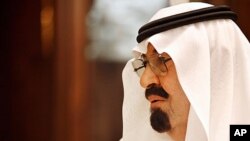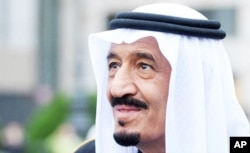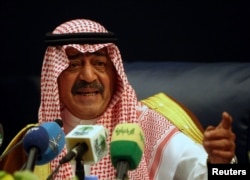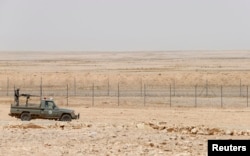It was Saudi Arabia's crown prince – not the king, as customary– who inaugurated the sixth session of the consultative Shura Council this week.
King Abdullah, 90, has been hospitalized with pneumonia for more than a week, and this has renewed speculation about who will succeed him to the throne and lead the kingdom during a time of political and economic uncertainty.
Since the death of the Kingdom’s founder Abdulaziz ibn Saud in 1953, five kings have ruled Saudi Arabia, all of them his sons. By tradition, the crown should pass from older brother to younger. Abdullah’s brother, Crown Prince Salman, will turn 80 this year, and is next in line.
But in the House of Saud, nothing is certain because no succession policy has ever been defined.
The 1992 Saudi Basic Law of Governance stipulates that rulers be selected from among the sons of the founder. Tradition dictates they be among the so-called "Sudairi seven," ibn Saud’s sons by his wife Hussa bint Ahmad Al Sudairi.
The law also states that on the death of the king, the crown prince will succeed him, providing he receives the required oaths of allegiance from religious clerics, tribal chiefs and others in the bay’ah, a formal ceremony with early Islamic roots. In essence, it gives the king the power to select or re-designate the crown prince
"Whether he becomes king rather depends on whether Salman can achieve an oath of allegiance from the other princes," said Simon Henderson, a Saudi expert at the Washington Institute for Near East Policy. "And this is debatable in that Salman is believed to be physically and mentally frail."
Salman, described as a "moderate conservative," is said to have suffered a stroke and to have an unspecified form of dementia.
Second in line for the throne is his younger brother, Deputy Crown Prince Muqrin bin Abdulaziz, a former intelligence chief who will turn 70 in September.
Muqrin is reported to be smart, affable and well-liked by diplomats.
"However, his credentials are particularly weakened by the fact that his mother was a slave girl, apparently from Yemen, which means that he does not quite have the pedigree which other princes have," Henderson said.
Muqrin is the son of Abdulaziz and his eighteenth wife, Baraka Al Yamaniyah, originally from Yemen.
Younger blood?
As Pulitzer Prize-winning journalist and Saudi expert Karen Elliot House told VOA in 2012, being one of the Sudairi seven is no guarantee a prince will be named King.
"You must also be deemed by the family to be the most competent and qualified," House said. "They have skipped brothers many times."
A 2006 law decrees that if the king becomes too ill to fulfill his duties, a medical committee will submit a report to Allegiance Council.
If the council determines that neither the king nor the crown prince are able to do their jobs, a transitory ruling council will step in to administer the kingdom, and the council will have a week to select a new king from among the remaining sons of the founder -- or his grandsons.
This means that one of the third-generation of princes could inherit the throne.
Princess Basmah bin Saud, the daughter of King Saud and the granddaughter of King Abdelaziz, recently returned to the Kingdom after many years living in London.
"There are definitely a lot of rumors going around right now," she said. "But I don’t expect very many surprises."
Uncertain times
News of the king’s hospitalization comes at a time of no small anxiety in the Kingdom.
The price of oil has fallen to below $50 a barrel, the lowest since 2009. The world is looking to Saudi Arabia, which holds more than 70 percent of the globe's proven oil reserves, to cut production and help raise prices.
But Saudi insists it will continue pumping oil at the current rate. And this means a decline in revenue, "while they still have huge government expenditure," Henderson said, and he believes the government will have to dip into some of its reserves to meet its costs in the coming year.
Additionally, Saudis are very nervous over nuclear negotiations taking place between the P5+1 and Iran.
"They have a morbid fear of Iran and the possibility that Iran might be recognized as some kind of nuclear capable state," he said.
Perhaps most unnerving to the Saudis, the Islamic State (IS) hovers at their borders and may be getting help from supporters inside the Kingdom. Among the victims of Monday’s pre-dawn attack on Saudi guards along the frontier with Iraq was the commander of Saudi Arabia’s northern border forces, Brigadier General Awdah al-Balawi.
As has been noted by Saudi analysts Nawaf Obaid and Saud al-Sarhan, if IS Abu Bakr al-Baghdadi truly wants to restore the historic “caliphate”, he would ultimately want to control Islam's two holiest sites, Mecca and Medina, in Saudi Arabia.
For now, Prince Salman continues to offer “reassurances” on the king’s health, and speculation is rampant in a royal house known for rivalry, rifts and intrigue.
Because the stakes are so high, Henderson believes we can expect much intrigue inside the House of Saud.
“If you are in the part of the family which is going to be the king or close to the king, then you’re lot is in,” he said. “But if you are in the part of the family which is going to lose out then you are probably going to be very resentful.”
NOTE: This report originally named Deputy Crown Prince Muqrin as one of the so-called Sudairi Seven, sons of founding King Abdulaziz ibn Saud and his wife Hassa bin Ahmed al-Sudairi. In fact, Muqrin is the son of Abdulaziz and his eighteenth wife, Baraka Al Yamaniyah of Yemen. The report has been amended to reflect that fact.




